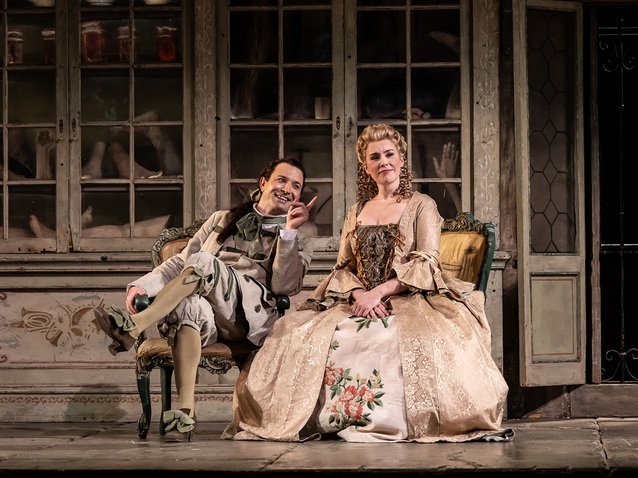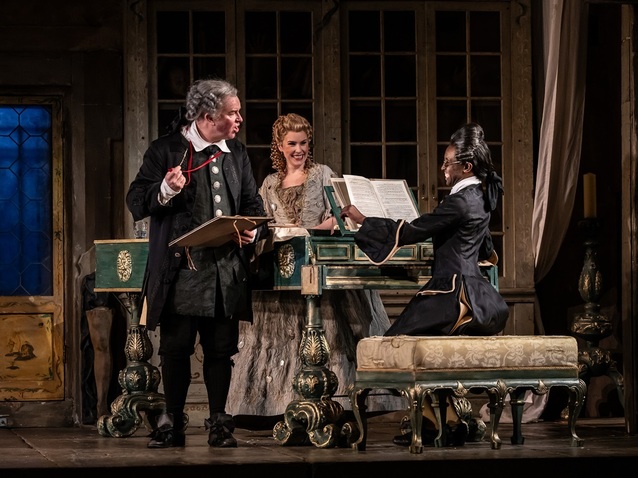 ENO’s The Barber of Seville 2024 © Clive Barda
ENO’s The Barber of Seville 2024 © Clive Barda
Several composers have based operas on plays in Pierre Beaumarchais’s Figaro trilogy, which comprises The Barber of Seville (1775), The Marriage of Figaro (1784) and The Guilty Mother (1792). By far the most famous of these were written by Mozart, whose 1786 opera has its origins in the second, and Rossini, who in 1816 utilised the first for his own comic masterpiece.
Like Donizetti’s Don Pasquale and Richard Strauss’ Der Rosenkavalier that were to follow, The Barber of Seville is the story of an ageing man attempting to put himself between two young lovers. Count Almaviva falls in love with Rosina, the ward of Doctor Bartolo, but does not want her to love him for his rank and so pretends to be a more lowly figure named Lindoro. Bartolo, however, wishes to wed Rosina, partly because he desires her wealth, and when he senses a rival this only encourages him to expedite his own marriage to her.
Bartolo keeps Rosina locked in his house, prompting Almaviva to don a series of disguises in order to gain access, helped all the while by the barber Figaro who is as much a general fixer as the man one hires for a shave. After a series of twists and turns, the young couple succeed in outwitting Bartolo by getting married before he can intervene, and the Doctor grudgingly accepts the situation when he is told he can keep Rosina’s dowry. The marriage subsequently proves to be far from happy, but that is the subject of the next play or opera in the sequence.

Charles Rice, Anna Devin, ENO’s The Barber of Seville 2024 © Clive Barda
At the age of thirty-seven, Sir Jonathan Miller’s vintage production for English National Opera feels almost as much a mainstay of the operatic repertoire as Rossini’s masterpiece itself. There have been periods when it has appeared at the London Coliseum every two to three years, but this current outing, headed by revival director Peter Relton, constitutes its first appearance since 2017. In fact, since it was last presented we have sadly witnessed the deaths of Miller and Amanda and Anthony Holden, responsible for the English translation of Cesare Sterbini’s libretto.
The strength of the production has always rested on its ability to provide an infrastructure that then enables the characters to dominate the proceedings. In Tanya McCallin’s attractive designs we witness an ancient Sevillean street, complete with classical column and shrine, that could have stood for centuries before Rossini was even born, and yet might feasibly still be seen today. This then rolls back to reveal the interior of Doctor Bartolo’s house, stuffed with globes, specimen jars and anatomical models, which creates a smaller performance area and thus enables the characters to become larger than life.
The vast majority of soloists are new to their roles in this production, and each proves to be highly accomplished. However, while each individually puts everything into portraying their respective character, the resulting product can seem rather clean-cut so that the dynamic does not feel particularly charged at the outset. Act II fares significantly better, when the energy does rise to the requisite levels, but the scene in which Figaro and Almaviva hatch their plan for the latter to enter Doctor Bartolo’s house does not entirely gel. This is a shame as the two individual performances are extremely strong. As the Count, Innocent Masuku reveals a highly pleasing tenor, with the precision and lightness of touch that he brings to the lines all contributing to his very beautiful sound. If he does not suggest that the brutish figure we see in The Marriage of Figaro lies beneath the playful exterior as much as some Almavivas, he does show how his rank and resulting sense of expectancy affect his behaviour. The fact he has no problem with behaving quite so badly as a drunkard in another person’s house certainly suggests that he sees everyone else as insignificant and beneath him.

Simon Bailey, Anna Devin, Innocent Masuku, ENO’s The Barber of Seville 2024 © Clive Barda
As Figaro, Charles Rice is engaging from his very first appearance. With ‘Largo al factotum’ featuring no props other than six wig heads, there is no heavy infrastructure to support the aria, which allows Rice to connect with the audience in a very personal way. His baritone is smooth and persuasive, and the manner in which he controls the action, although sometimes only just, is revealed by him frequently having to keep Almaviva under control while still delivering the digs at Doctor Bartolo. Anna Devin is a class act as Rosina on what is her ENO debut, although she played Gretel at the Royal Opera House as recently as last Christmas. Her soprano is sweet, bright and precise and her performance of ‘Una voce poco fa’ an undoubted highlight of the evening. In some portrayals of Rosina it is easier to believe that the ward can be a serpent when crossed than that she is sweet and caring by default. This is not the case with Devin’s interpretation, and it actually makes for a more multi-faceted character because we genuinely see that Rosina is as capable of being loving and thoughtful as she is of being strong and mischievous.
With his tremendous bass-baritone, Simon Bailey, who played Fasolt here last year, is an excellent Doctor Bartolo, and the more the evening progresses the more his antics hit the mark. This production’s ‘A un dottor della mia sorte’ features a very difficult manoeuvre as Bartolo has to trap his pince-nez in the harpsichord and then struggles to set himself free, all while continuing to sing. Bailey executes it well, so that his attempt to appear upstanding becomes increasingly hilarious, but there is also a sadness in his look that arouses our sympathy as we witness the other characters running rings around him.
With his superb bass, Alastair Miles reprises his role as the slimy music teacher Don Basilio from the 2017 revival. He appears particularly menacing during his ode to slander, ‘La calunnia è un venticello’, as he rises to his full height and generates huge shadows while Bartolo cowers in a chair. He is not, however, quite as sinister as some Don Basilios, which allows him to bring maximum comedy value to the role. Lesley Garrett, who has previously sung Rosina in this production, really goes to town playing the housekeeper Berta, with her own obvious enjoyment at singing ‘Il vecchiotto cerca moglie’ feeling infectious. Patrick Alexander Keefe is effective in the small but important role of Fiorello, and will play Figaro for the matinee on 27 February for what will be a Relaxed Performance with a largely different cast.
On his ENO debut, Roderick Cox’s conducting is extremely fine, as he elicits an exceptionally balanced sound from the orchestra that achieves an excellent combination of warmth, bubbly charm, cleanness and precision. One of the joys of this production is seeing just how things play out in each revival. For example, Doctor Bartolo might be paired with Berta at the end of one, only for that idea to be shelved in the subsequent outing and then reinstated in the next. On this occasion, despite some moments in Act I feeling a little low key, the performers bring the right sense of fun to the performance, and remind us how this is a classic production that can be enjoyed time and time again.
By Sam Smith
The Barber of Seville | 12 - 29 February 2024 | London Coliseum
the 14 of February, 2024 | Print
Comments